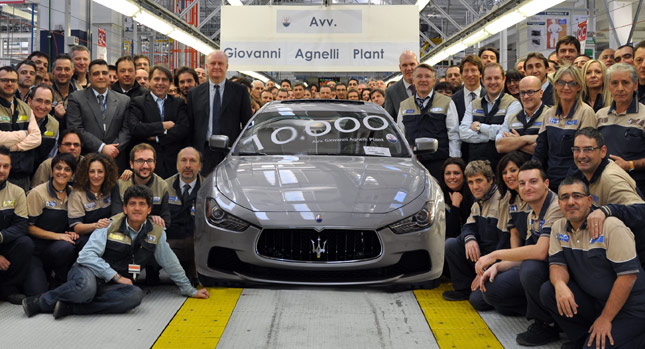“We wait until they get sleepy, waiting until they get so big they can barely move…and then we walk out of the shadows, quietly walk out of the dark…and strike!” This passage is from Maserati’s 2014 Super Bowl spot named ‘Strike’ (see below) and ironically, it seems fitting for what’s going on at the Italian firm’s plant in Grugliasco – at least if you see things from Fiat-Chrysler Automobile’s (FCA) perspective.
More than 200 employees out of a total work force of 2,019 people at the former Bertone factory in northern Italy went on a strike called by FIOM (Federazione Impiegati Operai Metallurgici) to protest against the “working conditions”, sparking a heated response from the Fiat-Chrysler group, which called their actions “absolutely incomprehensible”.
The FIOM union threatened a strike last week over a number of issues ranging from August holidays to stalled contract negotiations.
The Grugliasco factory that opened on January 2013 produces the Quattroporte and Ghibli sport sedans.
Below you will find Fiat-Chrysler’s press statement on the matter:
“Less than 11% of workers at the Maserati plant in Grugliasco, 209 out of a total 2,019, adhered to the strike called by FIOM which resulted in lost production of 11 vehicles.
Although relatively low in percentage terms, the strike by more than 200 workers is absolutely incomprehensible. Today’s strike, which was only partially adhered to, took place at one of the most modern auto assembly plants in the world, which is equipped with cutting-edge technology and produces luxury vehicles that are successfully sold in markets around the world. Fiat has invested around €1 billion to retool the plant for production of these new models.
At a time when unemployment in Italy has reached unprecedented levels, striking at a plant where jobs are being created and more than 90% of the vehicles are produced for the export market is absolutely irrational.
Even more difficult to understand is the fact that the strike is at a plant which, when Fiat bought it, had been closed for several years with no prospect of a return to production.
Fiat not only saved the jobs of more than 1,000 ex-Bertone workers, it also created an additional 1,300 positions enabling workers from the Mirafiori plant to return to work and it expects to create a further 500 positions beginning in September.
Clearly, when demand for a new model is strong the opportunity needs to be seized upon. Industrial actions like today’s, although participation was low, could have serious negative consequences for both the Company and workers.”
By John Halas
VIDEO







